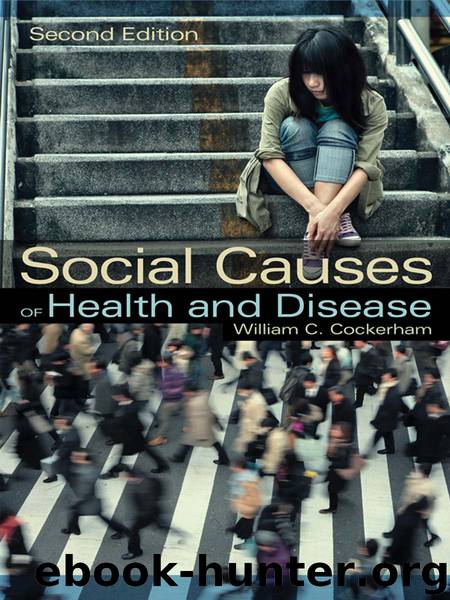Social Causes of Health and Disease by Cockerham William C.;

Author:Cockerham, William C.;
Language: eng
Format: epub
Publisher: Polity Press
Income Inequality
Another class-based but controversial explanation of health differences emerging from research in Britain is Wilkinson’s (1992, 1996; Wilkinson and Pickett 2006) income inequality or relative income thesis. Wilkinson focuses on the health of whole societies, rather than individuals. He suggests that a person’s position relative to other people in a social hierarchy can be determined by their relative incomes, and that the psychosocial effects of the different social positions have health consequences. In his view, stress, poor social support networks, low self-esteem, depression, anxiety, insecurity, and loss of a sense of control are reduced and social cohesion is enhanced when income levels are more equal.
While it is an established fact that people with low incomes have worse health and shorter lives than those with high incomes, Wilkinson claims that relative levels of income within a society have greater effects on health and mortality than the society’s absolute level of wealth. That is, what matters the most in determining health and mortality is not how wealthy a society is overall, but how evenly wealth is distributed within it. Countries with the most wealth may not have the longest life expectancy; instead, the best health and longevity is to be found in those nations with the smallest differences in income levels and smallest proportion of the total population living in poverty. This is seen in countries like the United States, for example, that have wide disparities in income and lower life expectancy than countries like Sweden, where income is more evenly distributed and life expectancy is higher.
But the most recent research does not confirm Wilkinson’s results. One problem is that data from developing countries do not show the same pattern. This is particularly the case in nations with subsistence agricultural economies where cash income may bear little relation to material and psychosocial well-being, while many goods and services are obtained directly from the environment and barter is common (Ellison 2002). This situation limits the utility of relative income theory to developed countries. But new studies conducted in countries with high per capita income likewise failed to find a significant association between income inequality and health (Beckfield 2004; Coburn 2004; Eberstadt and Satel 2004; McLeod, Nonnemaker, and Call 2004). The evidence is now mounting against the relative income thesis as increasing numbers of studies find it does not apply to either a broad spectrum of countries (Beckfield 2004; Judge, Mulligan, and Benzeval 1998) or the US (McLeod et al. 2004).
The popularity of the relative income thesis appears to be based less on empirical research and more on its logic that suggests health and longevity can be improved by restructuring society and redistributing its wealth – thus making it more of “a doctrine in search of data” than an accurate scientific hypothesis (Eberstadt and Satel 2004: 36). Few, if any, medical sociologists would deny that income is an important variable in health outcomes and that relative differences in income are typically reflected in relative differences in health. However, it cannot be proven that
Download
This site does not store any files on its server. We only index and link to content provided by other sites. Please contact the content providers to delete copyright contents if any and email us, we'll remove relevant links or contents immediately.
When Breath Becomes Air by Paul Kalanithi(7297)
Why We Sleep: Unlocking the Power of Sleep and Dreams by Matthew Walker(5682)
Paper Towns by Green John(4193)
The Immortal Life of Henrietta Lacks by Rebecca Skloot(3845)
The Sports Rules Book by Human Kinetics(3617)
Dynamic Alignment Through Imagery by Eric Franklin(3512)
ACSM's Complete Guide to Fitness & Health by ACSM(3483)
Kaplan MCAT Organic Chemistry Review: Created for MCAT 2015 (Kaplan Test Prep) by Kaplan(3440)
Introduction to Kinesiology by Shirl J. Hoffman(3318)
Livewired by David Eagleman(3160)
The River of Consciousness by Oliver Sacks(3010)
Alchemy and Alchemists by C. J. S. Thompson(2925)
The Death of the Heart by Elizabeth Bowen(2923)
Descartes' Error by Antonio Damasio(2759)
Bad Pharma by Ben Goldacre(2746)
The Gene: An Intimate History by Siddhartha Mukherjee(2512)
Kaplan MCAT Behavioral Sciences Review: Created for MCAT 2015 (Kaplan Test Prep) by Kaplan(2501)
The Fate of Rome: Climate, Disease, and the End of an Empire (The Princeton History of the Ancient World) by Kyle Harper(2454)
The Emperor of All Maladies: A Biography of Cancer by Siddhartha Mukherjee(2447)
